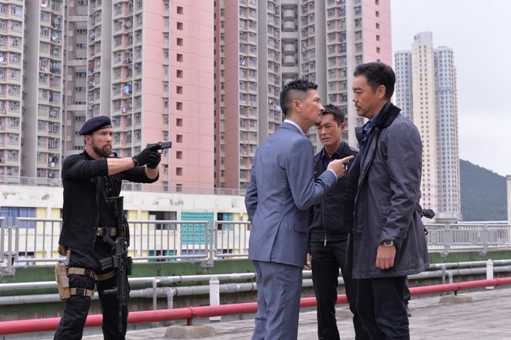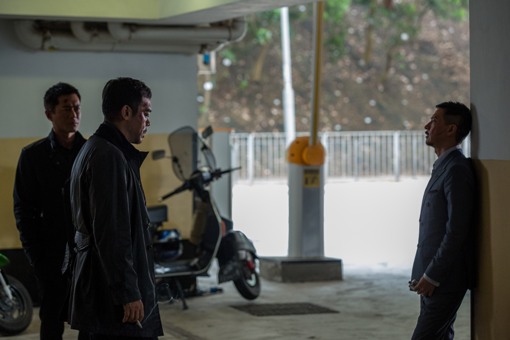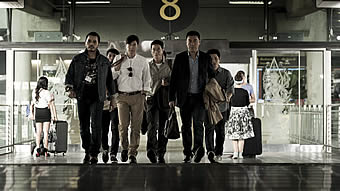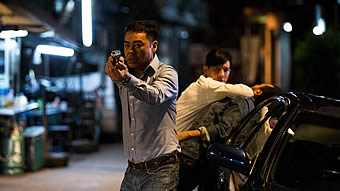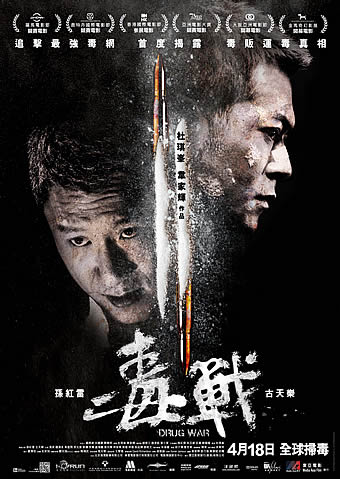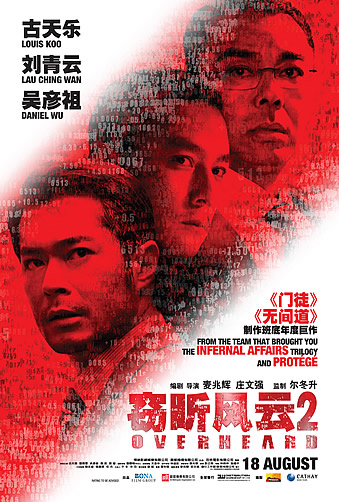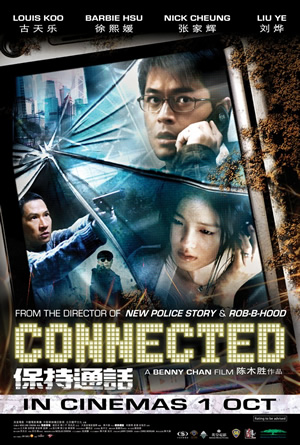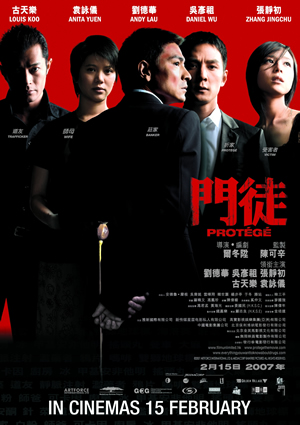THE WHITE STORM (扫毒) (2013)
Genre: Action/Thriller
Director: Benny Chan
Cast: Sean Lau, Louis Koo, Nick Cheung, Elanne Kwong, Lo Hoi-Pang, Yuan Quan, Berg Ng, Ken Lo, Ben Lam, Alex Fong, Hou Yong
RunTime: 2 hrs 15 mins
Rating: NC-16 (Violence and Drug Use)
Released By: Shaw & Scorpio East Pictures
Official Website:
Opening Day: 5 December 2013
Synopsis: Lifelong friends Tin (Sean Lau), Chow (Louis Koo) and Wai (Nick Cheung) all work for the Hong Kong Police Department’s Narcotics Bureau. The three law enforcers would readily risk their lives for each other, but a dangerous mission in Thailand to capture the legendary drug lord, Eight-Faced Buddha, puts that to the test. In Thailand, the covert goes bad at the last minute, and a battle breaks out. The three friends are confronted by a tragic emotional dilemma… Five years later, burdened with personal hardship, two friends are still seeking to revenge the loss of a third. Friendship turns into rivalry and brotherhood must be sacrificed once again. A war between good and evil unfolds, and there's no turning back!
Movie Review:
How often do you get the chance to see three of Hong Kong’s most charismatic male actors - Sean Lau, Louis Koo and Nick Cheung - on the big screen together? And just for that very reason, you’re probably entitled to go into Benny Chan’s crime thriller with high expectations. Yet even though the triumvirate does not disappoint one bit, everything else about the movie set against the backdrop of the fight against illegal narcotics simply comes off underwhelming, so much so that you can’t quite help but feel that their combined star wattage is somehow wasted.
No less than five writers have been credited for the sprawling narrative, which casts Lau, Koo and Cheung as childhood best friends who have since graduated into police officers of the narcotics bureau. Lau plays the de facto leader of the group, the most ambitious and headstrong of the lot, who in his role as Chief Inspector Tin also wields authority over his friends. On the other hand, Koo’s Chow has been deep undercover amongst the drug dealing triads for some time now, and since risen amongst the ranks to be Hak Tsai’s (Ben Lam Kwok Bun) right hand man. But he’s also disillusioned, especially with his wife expecting a baby, and wants out immediately.
Co-written by Chan himself, the script pits Tin against Chow when a sting operation supposed to be Chow’s last mission is aborted at the last minute. The higher-ups want Chow to continue undercover so they can bait a larger fish - the infamous kingpin named Eight Faced Buddha (Lo Hoi Pang) of the Golden Triangle – and Tin reminds Chow of his obligation as a police officer to obey orders. Compared to Tin and Chow, Cheung’s role as the soft-spoken Wai only becomes clearer at this point - he’s the pacifist among the lot, the one urging calm and reason as Tin and Chow butt heads with each other, reminding the duo of their longstanding friendship and soothing ruffled feathers where necessary. The one thing that never fails to bond them together? The 1980s TVB theme song “Vow to Enter Blade Mountain” by Adam Cheng.
Despite some strong initial reservations, Chow reluctantly accepts his orders to follow Hak Tsai into Bangkok to make contact with the Eight-Faced Buddha via a local dealer (Ken Lo Wai Keung). Needless to say, that operation set in the middle of a dense forested region ends badly - not only does Tin lose one of his men (veteran actor Ng Ting Yip), he is also eventually forced to make a choice between the devil and the deep blue sea. That impossible moral dilemma at the halfway mark also marks the high point of the movie – not only is it the single most emotionally intense moment of the whole film, it also marks the culmination of a thrilling action sequence in which Tin and his squad of men are outgunned by Buddha’s mercenaries at the trigger of a high-powered machine gun atop a helicopter.
Structured as two acts, the close of this chapter with a literal bang also represents the point at which the movie quickly goes downhill. A fundamental twist two-thirds into the film that sees the return of a key character from the dead is clichéd to say the least – especially since there is never a doubt where his loyalties lie despite the script’s attempt to inject some measure of excitement by suggesting otherwise - not to mention the resolution that plots the trio’s final showdown with Buddha at a nightclub in Macau. The character beats hardly make up for the plotting - in particular, every moment meant to be poignant seems to proceed on the mistaken notion that it must be a high strung one, meaning that the characters are consistently forced to confront each other by shouting and jostling, making for a tiresomely affected watch.
Chan’s direction here is also to blame. There is absolutely no subtlety to be found here, with Chan finding it necessary at every turn to crank the volume and the intensity of every scene to maximum. Not only does that make for plenty of cringe-worthy melodrama, it also creates too many moments of unnecessary histrionics. The lack of restraint applies as well to the overindulgent plot, which comes off unintentionally amusing at turns for being pure cliché. And nowhere is the excessiveness more apparent than in the final shootout, which aims for the kind of operatic grandeur associated with Johnnie To gangster movies (think ‘Exiled’) but falls far short by being simply too ridiculous; indeed, the sheer absurdity of that bullet-riddled showdown undermines what credibility the brotherhood-in-peril narrative had left, which ultimately rings hollow.
Just about the only element - or rather elements - holding the film together are the solid performances of the lead actors. Lau and Cheung prove yet again why they are the best actors of their generation, and despite the film’s tendencies, both know absolutely better than to overplay their characters, displaying both nuance and depth in their acting. Koo has, despite his best efforts, never quite been in the same league as his two other male co-stars. His deficiencies as an actor are even more stark - especially in certain scenes where he is called upon to emote, there is a genuine sense that he is trying and perhaps trying too hard. Aside from them, Ken Lo is a standout supporting act providing some welcome comic relief, while veteran actor Lo Hoi Pang braves a somewhat exaggerated get-up to ooze old-school menace as the villain of the show.
It’s a thorough pity therefore, that despite gathering some of the best acting talents from Hong Kong, this bombastic narco-thriller styled as a throwback to the John Woo hard-boiled thrillers of the 80s fails to be as compelling as it should be. Part of the fault lies with the messy script, lacking in the discipline and focus necessary to distil a gripping story of three friends whose bond of brotherhood is put to the test; while another part of the fault also lies with Chan’s distinct lack of awareness for excess, and whether in terms of drama or action, the tone is obstinately over-the-top. It isn’t Chan’s finest moment that’s for sure, and seeing as how there is no shortage of similar thrillers like ‘Drug War’ or ‘Protégé’ (both of which starred Koo), this latest addition is worthwhile only for being the rare opportunity to watch three of Hong Kong’s finest actors share the screen together.
Movie Rating:



(Never as compelling as it should be, this increasingly tedious exercise in excessiveness is redeemed only by three strong lead performances)
Review by Gabriel Chong
You might also like:
.jpg)
Movie Stills
